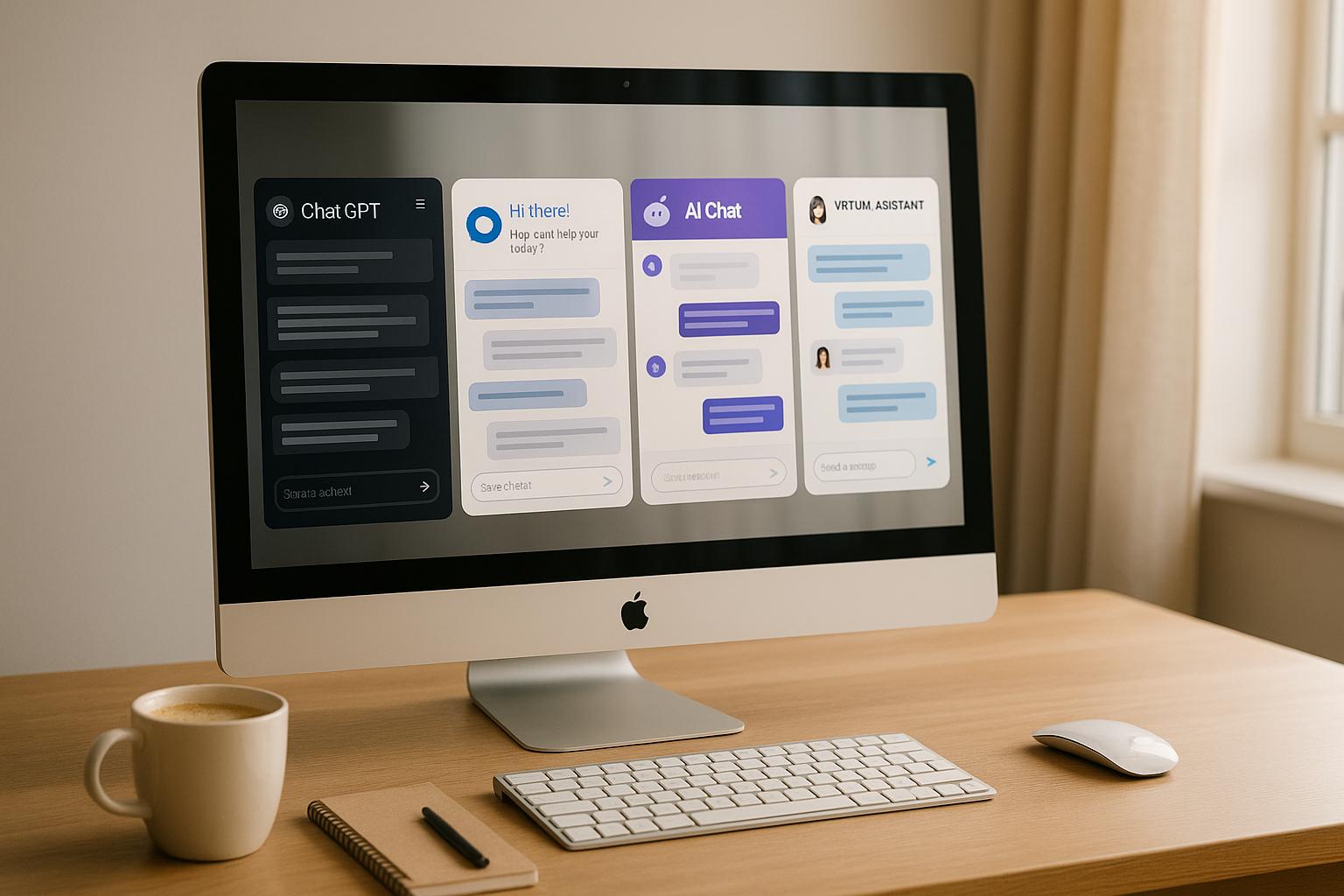In September 2025, startups are leveraging AI tools to tackle challenges like productivity, marketing, customer engagement, and operations. Here’s a quick rundown of 10 AI apps designed to help startups grow efficiently:
- AI Apps: A discovery platform with 1,000+ curated AI tools, helping startups find the right solutions quickly.
- Notion AI: Combines AI with a workspace to streamline tasks like content creation, project management, and scheduling.
- Canva AI: Simplifies design tasks, enabling teams to create professional visuals without advanced skills.
- PitchBob: Automates pitch deck creation by transforming business details into polished presentations.
- ProAI: Guides founders through building structured business plans and financial forecasts.
- Zapier: Automates workflows by connecting apps, reducing repetitive tasks.
- Xero: Handles accounting and financial management with integrations to streamline operations.
- SparkToro: Provides audience insights to refine marketing strategies and target the right customers.
- Runway ML: Makes video creation accessible by turning images into dynamic videos with AI.
- Clockwise: Optimizes team calendars, ensuring uninterrupted focus time for deep work.
These tools address critical needs such as efficiency, cost savings, and better decision-making, offering startups an edge in today’s competitive market. Below is a quick comparison of these apps:
| App Name | Primary Use | Key Benefit |
|---|---|---|
| AI Apps | AI tool discovery | Simplifies finding and integrating tools |
| Notion AI | Workspace and task management | Boosts productivity and team organization |
| Canva AI | Design creation | Enables quick, high-quality visuals |
| PitchBob | Pitch deck creation | Speeds up investor presentation prep |
| ProAI | Business planning | Structures business strategies and forecasts |
| Zapier | Workflow automation | Automates repetitive tasks seamlessly |
| Xero | Accounting | Simplifies financial tracking and reporting |
| SparkToro | Audience research | Delivers actionable customer insights |
| Runway ML | Video content creation | Produces videos without complex tools |
| Clockwise | Calendar management | Protects focus time and boosts productivity |
Explore these tools to find the ones that align with your startup’s needs and priorities.
10 Must-Try AI Tools For Startups & Entrepreneurs (2025)
1. AI Apps
AI Apps serves as a discovery platform tailored to one of the biggest challenges startups face: finding the right AI tools without spending endless hours researching. With over 1,000 curated AI tools in one place, it simplifies the process of discovering, comparing, and integrating the best solutions.
Relevance to Startup Needs
Startups often juggle tight budgets and deadlines, and AI Apps addresses this by streamlining the tool selection process. Its multi-step verification ensures only high-quality tools make the cut, saving users from costly trial-and-error experiences. Whether a startup needs help with marketing, operations, or other areas, the platform’s advanced filtering options allow users to sort tools based on specific business needs and budget constraints.
One standout feature is the section highlighting newly launched and featured tools. This is a game-changer for startups aiming to gain a competitive edge by adopting the latest validated solutions early. Such tools can significantly reduce operational costs during critical growth periods, making this feature particularly valuable.
Key Features
The platform is thoughtfully organized into categories like AI Art, Text, and Video tools, making it user-friendly - even for founders without technical expertise. Advanced filtering options further enhance the experience, enabling users to quickly find tools that align with their goals and budget.
AI Apps also allows developers to submit their tools, ensuring the platform remains up-to-date with the latest innovations. With both free and paid listing options available, it caters to startups at all budget levels.
Integration with Existing Workflows
AI Apps doesn’t just help you find tools - it ensures they fit seamlessly into your existing workflows. By acting as a discovery and comparison hub, it enables founders to evaluate tools for compatibility with their current tech stacks, all without the risk of vendor lock-in. Clear, concise summaries for each tool make it easier for teams to assess their options before committing to any new software.
For added value, the platform includes a blog section that offers insights into AI trends and practical implementation strategies. This educational content is ideal for founders looking to make well-informed decisions about AI adoption.
US Compliance and Localization
For startups based in the United States, AI Apps simplifies integration by offering localized pricing in US dollars and highlighting tools that meet American business standards. This focus on compliance is particularly helpful for navigating complex areas like data privacy, financial reporting, and industry-specific regulations.
With free listing options for bootstrapped startups and paid featured listings for companies looking to enhance their visibility, AI Apps is designed to support startups at every stage of their journey. Whether you’re just starting out or scaling up, this platform provides a practical solution to finding and integrating the right AI tools.
2. Notion AI
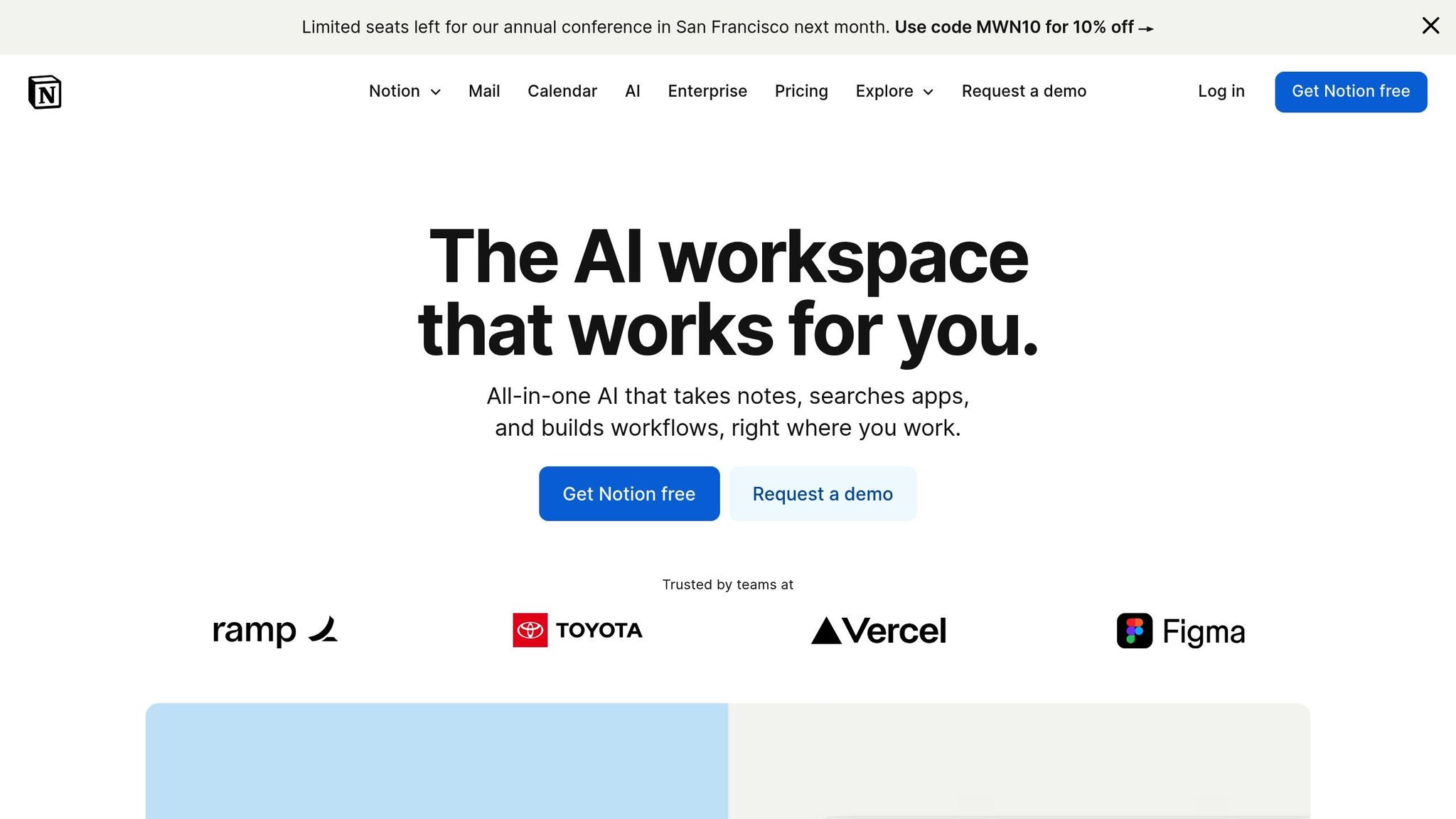
Notion AI combines a unified workspace with cutting-edge AI models like Claude 4 and GPT-5 (beta) to simplify complex tasks, saving startups countless hours. By blending advanced AI with an all-in-one platform, Notion AI boosts productivity and streamlines operations for startups.
Here’s a telling stat: 50% of Y Combinator startups and 94% of Forbes AI 50 companies use Notion. Even more impressive, 70% of users consolidate multiple tools into Notion, reducing the need for additional software.
In 2025 alone, Notion’s rapid innovation stood out, with over 30 updates rolled out in the first six months - averaging more than one new feature every week.
Relevance to Startup Needs
Startups often face tight schedules and limited resources, and Notion AI directly addresses these challenges. For example:
- Content creators report a 60–70% increase in output.
- Project managers save 4–6 hours every week.
- Researchers cut 6–8 hours from their workload.
Beyond saving time, Notion AI offers tools like writing assistance and document summarization, both of which simplify day-to-day tasks.
Key Features
Notion AI offers a suite of smart tools to enhance efficiency. Here are some highlights:
- Database Properties: Features like smart autofill, contextual suggestions, and structured content creation improve how teams organize and manage data. AI takes over repetitive tasks like routine data entry, freeing up valuable time.
- Notion Mail: This tool automates email management with features like auto-labeling, response drafting, and integration into Notion databases.
- Native Scheduling: The Notion Calendar lets teams manage bookings, tasks, and meetings while linking everything directly to project workflows.
- Smarter Forms: Available on Business and Enterprise plans, these forms use conditional logic to display follow-up questions based on user responses, making data collection more dynamic.
Integration with Existing Workflows
With the Model Context Protocol (MCP), Notion AI works seamlessly with external tools like ChatGPT and Claude, enabling startups to update content and refine workflows without switching platforms. Instead of trying to master every new feature, startups can focus on leveraging a few key tools for maximum impact.
US Compliance and Localization
When it comes to data security, Notion AI prioritizes user privacy. It doesn’t use customer data for model training and employs secure encryption alongside advanced permissions systems. It also meets major US compliance standards, including GDPR, CCPA, SOC 2 (Type 2), and ISO 27001.
3. Canva AI
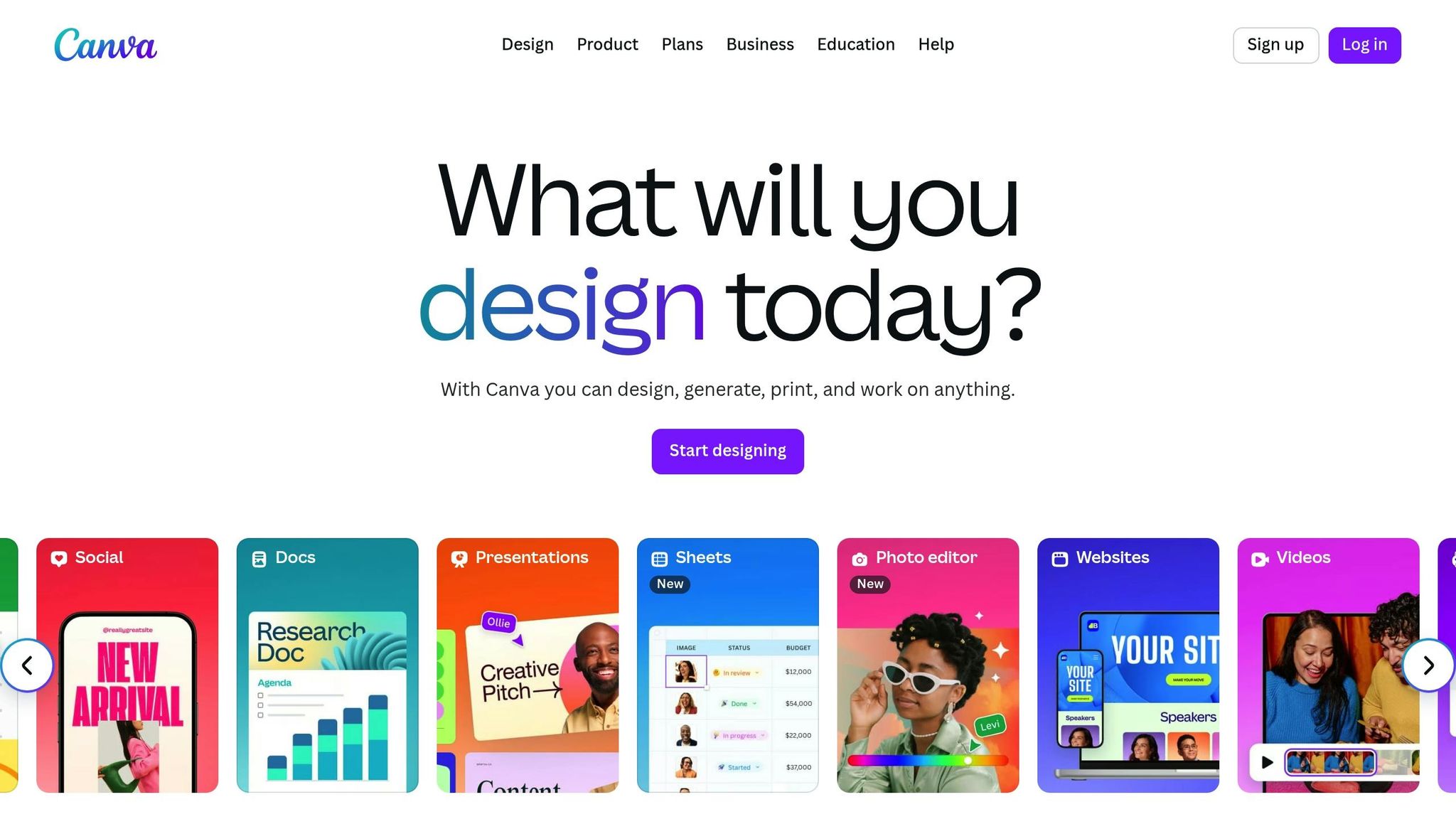
Canva AI makes design effortless with its intuitive drag-and-drop interface, perfect for teams that lack dedicated graphic designers. It empowers users to create professional-looking visuals across various formats with ease.
For teams working within tight budgets and deadlines, Canva AI is a game-changer. It simplifies the process of crafting marketing materials and brand assets, helping maintain a cohesive visual identity while saving both time and money.
What’s more, Canva AI seamlessly integrates with popular productivity tools, making collaboration smooth and design revisions quick. This ensures the design workflow keeps up with the fast-paced demands of startup environments.
4. PitchBob
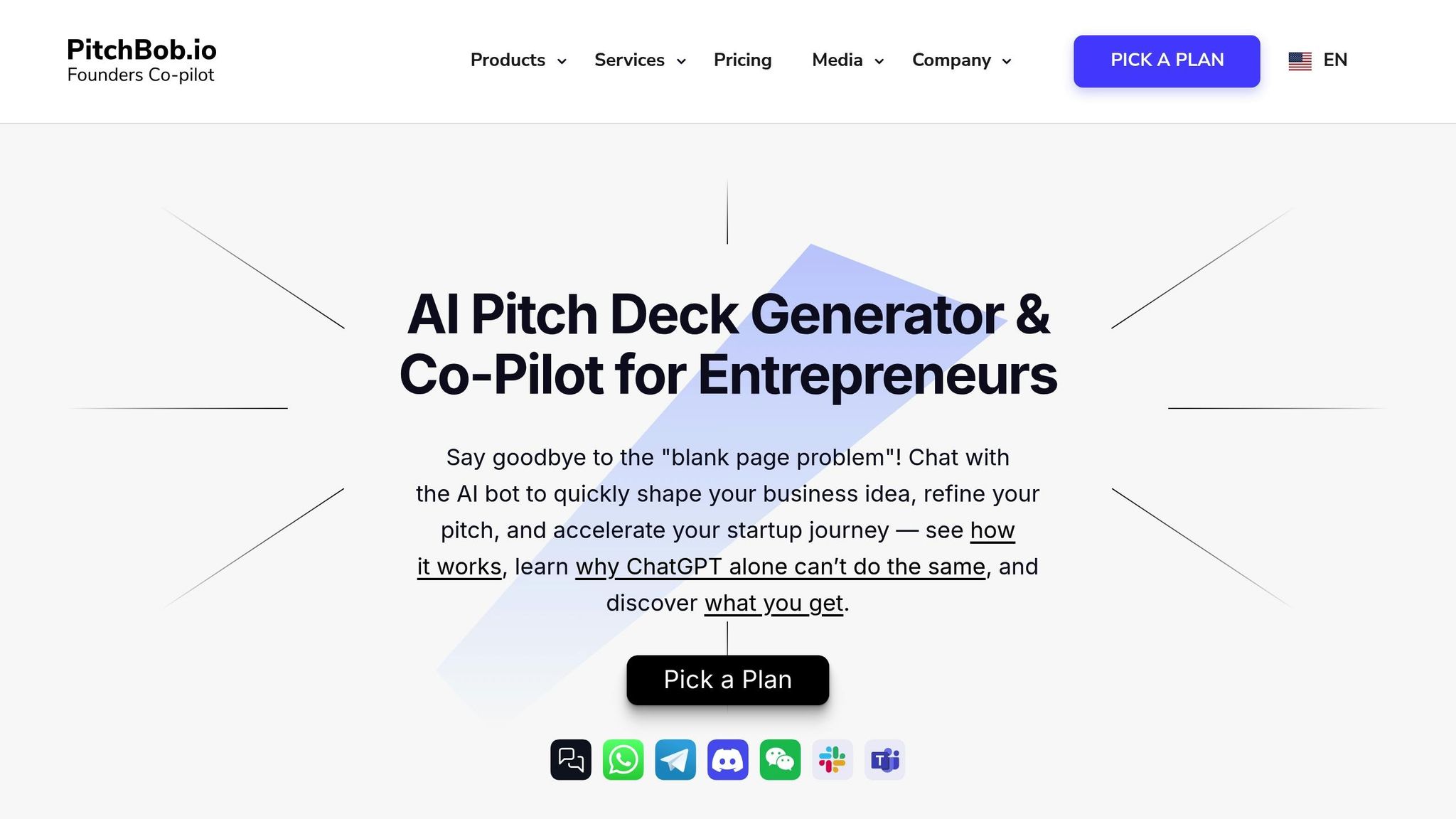
PitchBob is an AI-driven platform built to help founders craft investor presentations quickly and effectively.
Why Startups Need It
Creating a pitch deck can often pull founders away from critical tasks like building their product or growing their customer base. PitchBob steps in to streamline this process by asking targeted, structured questions about the business. This approach is particularly useful for first-time entrepreneurs who may still be honing their investor communication skills.
What It Offers
PitchBob uses a conversational interface to gather key details about a business, transforming those inputs into polished slide content. It provides a variety of presentation templates based on common frameworks, but it also allows for customization to fit the specific needs of a startup and its target audience.
The platform also supports collaboration, letting team members contribute their expertise. This ensures the final deck reflects a well-rounded perspective, incorporating both technical knowledge and market insights.
Seamless Integration
PitchBob works with popular file-sharing platforms like Google Drive and Dropbox, making it easy to keep pitch decks updated. Presentations can be exported in formats such as PowerPoint, PDF, or Google Slides. On top of that, its integration with common CRM tools helps founders track how their pitches are shared and monitor engagement metrics, providing valuable data to improve future efforts.
5. ProAI
ProAI transforms bold ideas into solid business plans, tailored specifically for startups.
Why Startups Need ProAI
For many tech-focused founders, turning a great idea into a structured business plan can feel overwhelming. ProAI simplifies this process, guiding entrepreneurs to focus on critical areas like defining their strategy, understanding the market, and preparing financial forecasts. It’s designed to tackle these challenges head-on, providing clarity and structure where it’s most needed.
What ProAI Offers
ProAI offers step-by-step guidance to create polished business plans and detailed financial projections. It organizes key strategic elements into professional, easy-to-understand documents, saving founders time and effort.
Seamless Integration and US Standards
ProAI is built for smooth integration into existing workflows. It exports documents in standard formats that align with US regulatory and financial requirements, ensuring startups can confidently make informed and compliant decisions. By adhering to these standards, it supports entrepreneurs in navigating the complexities of launching a business.
6. Zapier
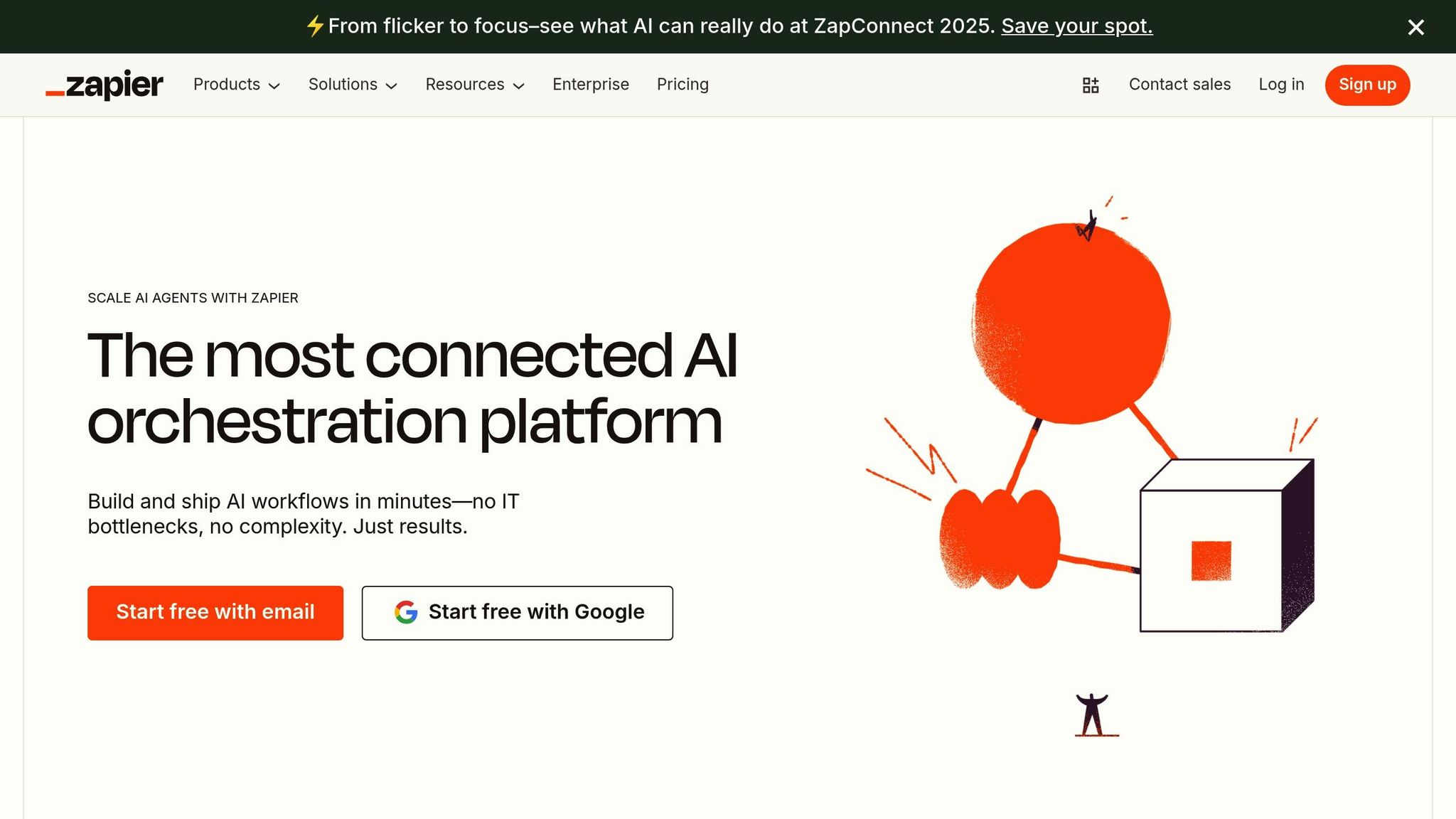
Zapier takes the hassle out of repetitive tasks by linking various apps and services, allowing startup teams to dedicate their energy to impactful work instead of getting bogged down by manual processes.
Why Startups Need Zapier
Startups often juggle tight budgets and limited resources, which makes optimizing routine operations a must. Tasks like transferring data between platforms, updating spreadsheets, or sending follow-up emails can eat into valuable time that could be spent on growing the business. Zapier solves this by offering automated workflows - called “Zaps” - that connect multiple apps and handle these tasks without requiring any coding skills. This automation frees up time for founders and small teams to focus on priorities like product development, customer acquisition, and investor engagement.
Features That Stand Out
Zapier connects thousands of apps, including popular tools like Gmail, Slack, Trello, HubSpot, and QuickBooks. Its intuitive drag-and-drop interface makes building automation workflows simple, even for beginners.
With multi-step Zaps, you can create advanced workflows involving several apps and even set up conditional logic. For example, when a new customer signs up on your website, Zapier can automatically add them to your CRM, send them a welcome email, create a task in your project management tool, and update your analytics dashboard - all without lifting a finger.
Zapier also includes built-in filters and formatters, making it easy to tailor data transfers between apps. This ensures that information is accurate and properly formatted, even if the apps use different data structures.
How It Fits Into Your Workflow
Zapier works effortlessly with the tools your team already uses. Start small with basic, single-step automations, and as your team grows more comfortable, you can build more complex workflows.
Take lead management as an example: when someone downloads a resource from your website, Zapier can add their details to your CRM, assign the lead to a team member, and schedule a follow-up task - so no potential customer slips through the cracks. In customer support, incoming emails can automatically create tasks, notify the right team members, and update customer records, ensuring your team stays on top of support requests while maintaining efficiency and responsiveness.
7. Xero

Xero is a cloud-based accounting platform designed to handle routine financial tasks while providing key financial insights. It allows founders to maintain precise records and focus on growing their businesses.
Relevance to Startup Needs
As startups grow, managing finances manually can quickly become a hassle. Xero simplifies this process with its App Store, which offers a variety of certified integrations to enhance its core features. These integrations help reduce manual data entry and give startups a clear, comprehensive view of their finances. This is especially important when making strategic decisions or preparing financial reports for investors.
Key Features and Integrations
Xero gives startups the flexibility to customize their financial management by offering a wide selection of certified apps. These apps streamline essential tasks like invoicing, time tracking, and customer relationship management. According to user feedback, 88% of customers feel that Xero helps them manage their business finances in one centralized platform. For businesses with unique needs, Xero's open API allows developers to create custom integrations, ensuring the platform evolves alongside the startup. This makes Xero a powerful tool that works seamlessly with other AI-driven solutions to optimize startup operations.
sbb-itb-212c9ea
8. SparkToro
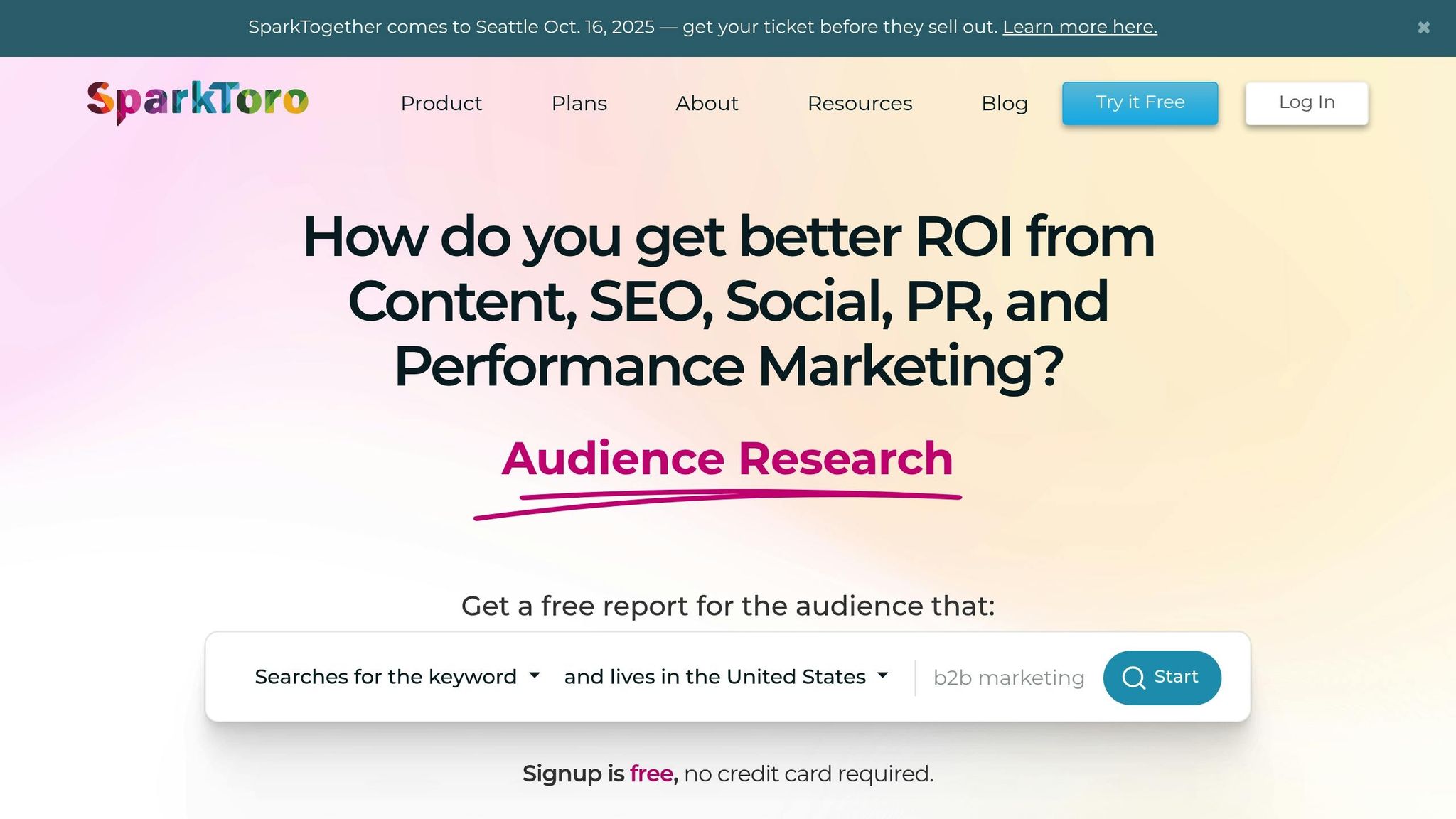
SparkToro is a powerful tool that provides deep audience insights, making it a game-changer for startups aiming to nail their marketing strategies. Instead of just offering basic demographic data, this audience research platform dives into how your target customers behave online. It reveals the websites they visit, the keywords they search for, and the topics they care about most.
Relevance to Startup Needs
For startups, creating marketing content that truly connects with their audience can be a major challenge. While traditional demographic data tells you who your customers are, SparkToro goes further by showing you how they engage online. This is especially important for startups working with limited budgets, where every marketing dollar needs to count.
Take this example: SparkToro’s analysis of Balsamiq.com revealed that 55% of its audience came from engineering backgrounds. This insight allowed ChatGPT to craft laser-focused headlines like, "This is the easiest way to create wireframes, no design degree required". Another analysis in 2025 uncovered that searches for "payment processor" were dominated by crypto-related content, guiding campaigns toward more effective B2B messaging.
Key Features
SparkToro’s features are designed to make audience research actionable:
- Contact Information Access: Paid plans include a "Get Contact Info" feature, offering email addresses and social media profiles.
- Influence Mapping: The platform identifies the podcasts, publications, and social accounts that matter most to your audience. This is invaluable for PR efforts and partnership outreach.
- Flexible Plans: SparkToro offers free subscriptions, with premium plans starting at $38/month. The Standard plan, priced at $112/month, includes 300 searches, demographic insights, and contact data.
These tools don’t just deliver insights - they also integrate seamlessly with your current marketing stack, ensuring you can act on the data quickly and effectively.
Integration with Existing Workflows
One of SparkToro’s standout strengths is how easily it works with the tools you already use. You can export its audience insights and bring them into AI platforms like ChatGPT to create highly targeted content - think headlines, ad copy, or social media ideas. It also complements SEO tools by adding valuable context about who is searching for certain keywords, helping startups avoid wasting time on irrelevant terms.
9. Runway ML
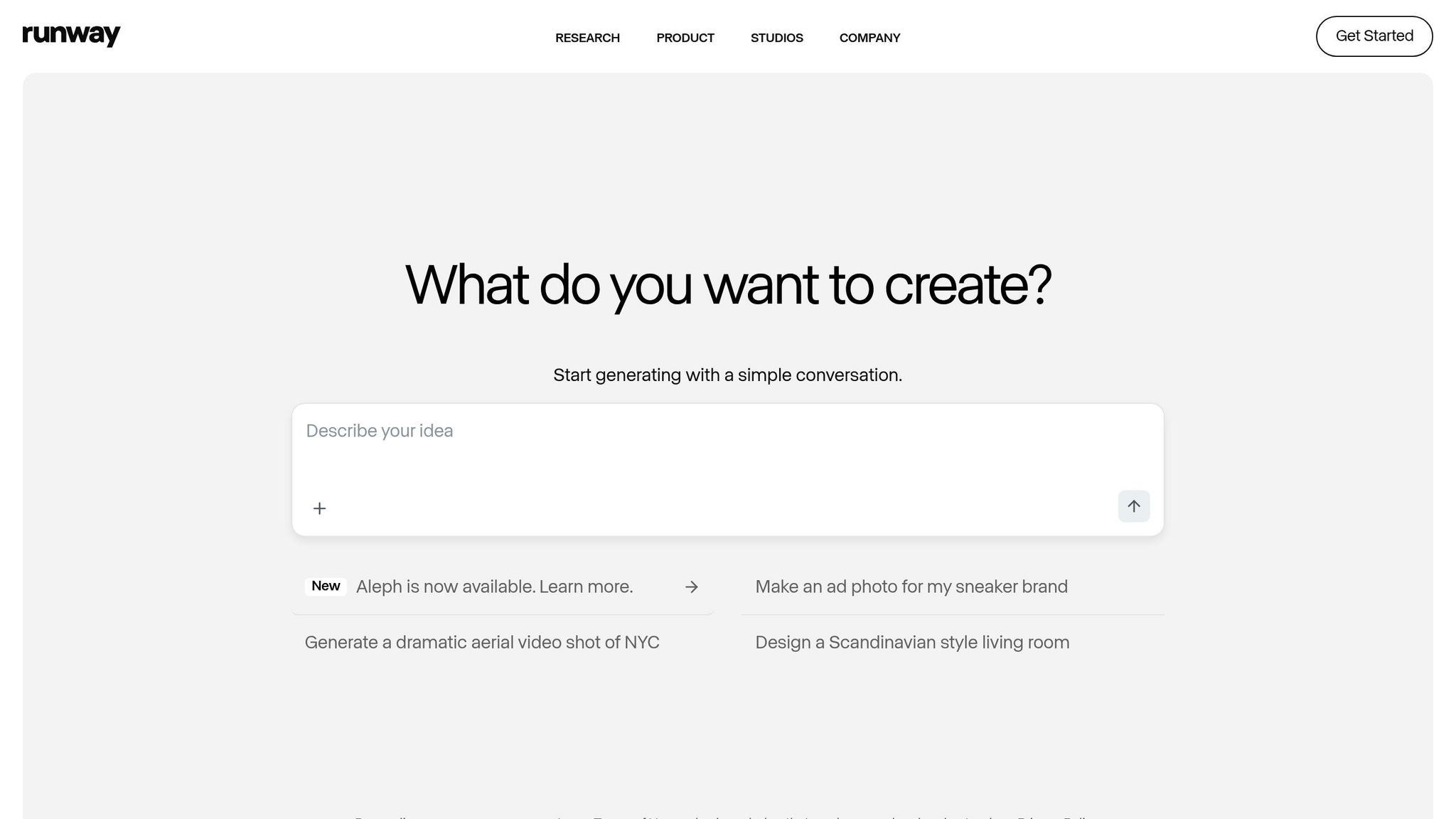
Runway ML is changing the game for startups in video content creation. It offers professional-grade AI tools that eliminate the need for costly equipment, complex software, or specialized skills. With this platform, startups can quickly transform static images into engaging videos without hiring expensive production teams or spending hours mastering complicated tools.
Why It Matters for Startups
For startups, video content is a must for effective marketing. But traditional video production can be a serious drain on both time and money. Runway ML makes it easier and more affordable by giving startups the ability to create demos, social media clips, and promotional videos with minimal effort. The ability to turn static images into videos is especially helpful for industries like e-commerce and SaaS, where speed and cost efficiency are critical.
Standout Features
Runway ML packs a range of features that cater directly to startup needs:
- "Generate a Video from Image(s)": Upload static images and turn them into dynamic videos with AI-generated motion and effects.
- "Generate an Image": Create unique visuals from text descriptions, saving on design costs while producing custom graphics.
- "Make an API Call": Developers can integrate Runway ML's capabilities directly into their apps or websites, streamlining workflows and enhancing functionality.
These features are designed to fit seamlessly into the fast-paced environment of startups, helping them produce high-quality content without breaking their budgets.
Seamless Integration with Startup Tools
Runway ML is built to work effortlessly with the tools startups already rely on. Through Make.com, where it’s listed as a "Verified" integration, startups can integrate video creation into their existing workflows. The platform connects with a wide range of essential applications:
- Communication and Collaboration: Slack, Notion, Google Docs, Gmail, and Microsoft 365 Email.
- Project Management: Airtable, monday.com, and ClickUp.
- Marketing and Sales: HubSpot CRM, Facebook Lead Ads, Instagram for Business, Pinterest, and Shopify.
Runway ML also integrates with data and AI tools like Google Sheets, Google Drive, OpenAI platforms, and Google Gemini AI. For example, imagine adding new product details to a Google Sheet and having Runway ML automatically generate a product video based on that information. Using Make.com, startups can design and automate workflows that connect Runway ML with other apps, allowing them to focus on growth while automating repetitive tasks.
"Automation isn't a luxury. It's the backbone of startup survival and scale." - Dipole Diamond
Runway ML's ability to integrate and automate makes it a powerful ally for startups aiming to streamline operations and create impactful video content with ease.
10. Clockwise

Clockwise is an AI-driven tool that helps teams carve out uninterrupted time for deep work by intelligently managing calendars. By automatically scheduling meetings and protecting focus time, it reduces distractions and prioritizes productivity. This makes it a powerful resource for teams where every moment matters, especially when frequent interruptions or context-switching can derail progress on critical tasks.
Relevance to Startup Needs
Startups often deal with packed schedules and constant interruptions, making it hard to focus on meaningful work. Clockwise solves this by automatically identifying and securing focus time in team calendars. Its AI analyzes meeting patterns, team workflows, and individual preferences to create optimal blocks of uninterrupted time, allowing team members to tackle their most pressing tasks.
For startups operating with lean resources, boosting productivity without adding headcount is key. Clockwise helps teams maximize their output by ensuring everyone has dedicated time for deep work. Over time, the AI adapts to team behaviors, fine-tuning its scheduling to meet the unique needs of the group.
Key Features
Clockwise offers several features aimed at addressing productivity challenges:
- Focus Time: Automatically blocks the best time slots for deep work, balancing team collaboration and individual preferences.
- Smart Scheduling: Goes beyond basic calendar management by distinguishing tasks that require intense focus from those that allow for interruptions.
- Team Insights: Provides data on how time is used, helping leaders identify inefficiencies and streamline workflows.
- Slack Integration: Updates Slack statuses automatically when someone is in focus mode, signaling availability without manual adjustments.
These features are especially useful for startups that need to balance collaboration with uninterrupted work periods.
Integration with Existing Workflows
Clockwise integrates effortlessly with tools that startups already rely on. It works directly with Google Calendar and Outlook, so teams can maintain their current scheduling habits without learning a new system.
The Slack integration keeps communication streamlined. For example, when someone is in a focus block, their Slack status updates to show they're unavailable, along with the time they'll be free again. This prevents unnecessary interruptions while ensuring urgent matters can still be addressed.
For teams using project management platforms like Asana or Notion, Clockwise helps ensure that the time needed for project work is reserved in the calendar. By syncing with these tools, it creates a unified workflow, making project deadlines more manageable and achievable.
US Compliance and Localization
Clockwise is designed with US teams in mind, adhering to privacy standards and supporting standard US time zones and date formats. Its pricing is displayed in US dollars, and its features align with typical American work schedules.
For startups with team members spread across different US time zones, Clockwise's AI accounts for these differences. It ensures that East Coast and West Coast teams can collaborate effectively while respecting each other's productivity windows. This thoughtful scheduling approach helps maintain a balance between teamwork and individual focus, no matter where team members are located.
App Comparison Table
Here's a quick side-by-side look at some of the top tools, their primary functions, and the standout advantage they bring to your business.
| App Name | Function | Key Benefit |
|---|---|---|
| AI Apps | Multi-purpose AI toolkit | Simplifies multiple business processes on a single platform |
| Notion AI | Smart workspace and documentation tool | Boosts team organization and makes information easily accessible |
| Canva AI | AI-driven design platform | Lets users create professional designs without needing advanced skills |
| PitchBob | AI-powered pitch deck creator | Quickly builds investor-ready presentations |
| ProAI | Automated business planning tool | Helps craft detailed business plans with ease |
| Zapier | Workflow automation software | Connects apps to automate repetitive tasks seamlessly |
| Xero | AI-enabled accounting solution | Makes financial management and reporting straightforward |
| SparkToro | Audience research tool | Delivers deep insights into customer behavior and preferences |
| Runway ML | AI-based video and content creation platform | Creates high-quality video content with minimal effort |
| Clockwise | AI calendar and productivity manager | Optimizes schedules to improve focus and efficiency |
For the latest features and pricing, visit each tool's official website.
Conclusion
This guide highlights how AI tools are reshaping the way American startups operate, offering practical solutions to tackle key challenges like managing cash flow, optimizing operations, crafting compelling marketing content, and improving team productivity. These tools aren't just about saving time - they can also help reduce costs, extend your financial runway, and support faster growth.
The key to success lies in thoughtful implementation. Instead of trying to adopt every tool available, focus on those that directly address your startup's biggest challenges. For example, a content-focused startup might prioritize tools that enhance creative workflows, while a B2B service company could benefit from tools that provide deeper audience insights and streamline automation.
As September 2025 progresses, startups that embrace these AI tools will likely gain a competitive edge in efficiency, customer engagement, and adaptability to market changes. AI is changing how startups operate - it’s up to you to decide how quickly to act.
Take the time to explore these tools and find the ones that align with your goals. The choices you make today could set the stage for a more efficient and successful future.
FAQs
How can startups choose the right AI app that fits their goals and budget?
How Startups Can Choose the Right AI App
Startups looking to integrate AI into their operations should begin by defining what they aim to achieve. Are you seeking to boost productivity, sharpen your marketing strategies, or simplify customer interactions? Having a clear goal will make it easier to find an app that fits your needs.
Once your objectives are set, evaluate potential tools based on their features, ability to scale, and how well they align with your goals. Don’t overlook your budget - look for apps with pricing options that can grow with your business. The ideal choice should offer a balance between cost and value, delivering a solid return on investment (ROI).
Lastly, take the time to explore user reviews and success stories. These can offer a glimpse into how the app performs in real-world situations and whether it’s a good match for your business.
What challenges might startups face when adopting AI tools into their workflows?
Startups often face a range of hurdles when incorporating AI tools into their workflows. One major obstacle is technical integration. Ensuring that AI tools align with existing systems and infrastructure can be tricky, especially when dealing with older, legacy systems that weren't designed with modern AI solutions in mind.
Data-related challenges are another significant concern. Startups need to safeguard data security, uphold privacy standards, and deal with potential mismatches in data formats. On top of that, limited access to high-quality data - essential for training AI systems - can pose a serious roadblock.
Lastly, team resistance can slow down the adoption process. Employees might feel uneasy about how AI could change their roles or may lack the skills needed to use these tools effectively. Tackling these issues with thoughtful planning, open communication, and comprehensive training programs can make the transition much smoother.
How can AI tools help startups comply with US business regulations and standards?
How AI Tools Help Startups Navigate US Business Regulations
AI tools have become essential for startups aiming to stay on top of US business regulations. By automating processes like monitoring, reporting, and auditing, these tools simplify compliance and reduce the risk of penalties. They also keep track of regulatory changes in real-time, ensuring businesses can quickly adapt to new legal requirements.
Take compliance tools powered by AI, for instance. These systems can create detailed audit trails, making it easier for startups to showcase transparency and accountability during reviews or inspections. They can also detect biases and conduct ethical assessments to ensure operations align with industry standards, including frameworks like the US AI Bill of Rights. With these tools in place, startups can handle legal risks more effectively and dedicate their energy to scaling their business, rather than getting bogged down by the complexities of compliance.
